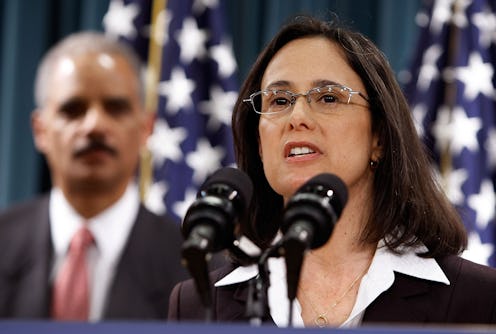News
How Illinois' AG Plans To Challenge Trump

Late last month, President Donald Trump dismissed former acting attorney general Sally Yates, after she refused to defend his executive order travel ban. Trump's decision to fire Yates made her a martyr for justice to many, while others argued it was her professional obligation to defend the federal government. Illinois attorney general Lisa Madigan thinks Yates may just be the first example of attorney generals defying Trump, and she shares with Bustle why she believes she and her colleagues will be particularly busy during the next four years.
"I would say that for the most part it's unusual for state-level officials to get engaged in what appears to be an international [issue]," Madigan says. However, she also notes that "a lot of statutes are federal but implemented on a state-level. That's where state attorney generals come in."
It was just less than two weeks after his inauguration that Trump fired Yates. The lengthy White House statement that addressed the dismissal of Yates accused her of betraying the Department of Justice:
The acting Attorney General, Sally Yates, has betrayed the Department of Justice by refusing to enforce a legal order designed to protect the citizens of the United States.
Yates offered her own response following the dismissal, saying, "I am responsible for ensuring that the positions we take in court remain consistent with this institution's solemn obligation to always seek justice and stand for what is right."
As it turns out, so far the judicial system is siding against Trump's travel ban, with the 9th Circuit Court of Appeals ruling earlier this month refusing to list a block on the order.
At the end of January, Madigan was one of 16 state attorney generals who opposed Trump's travel ban and signed a joint statement declaring it "unconstitutional, un-American and unlawful." The statement went on to declare: "We are confident that the Executive Order will ultimately be struck down by the courts. In the meantime, we are committed to working to ensure that as few people as possible suffer from the chaotic situation that it has created."
During her interview with Bustle, Madigan emphasizes how attorney generals take care in checking whether there is anything unconstitutional about federal statutes when they reach state-level implementation. "We [state attorney generals] always end up looking at the law and we determine based on that, whether there's a violation that has taken place," Madigan says.
I think we're going to be busy.
Specifically, she believes that attorney generals are permitted to step in with something like Trump's executive order. "When you look at the facts underlining the executive order, particularly the extreme vetting for travel, you see there are provisions where they are favoring one religion over another religion, which is prohibited by the establishment clause," she argues.
While this may have marked the first coalition that state attorney generals made against Trump, Madigan believes this may just be the beginning. "I think we're going to be busy," Madigan says. "Even during the Bush era we were coming together, particularly around environmental enforcement. ... Under the Obama administration we saw Republican attorney generals start to fight against federal statutes."
As Madigan alludes to, Democratic attorney generals' actions to combat Trump are from unprecedented. Republican state attorney generals challenged various laws and policies under President Barack Obama, including provisions of the Affordable Care Act.
While the last eight years have shown Republican state attorney generals fighting against the president's policies, Madigan shares that now, during Trump's presidency, that paradigm will likely flip.
"I think we're going to see a role reversal where Democratic AGs take a very critical look at what takes place on the federal level. When things are not constitutional or harming the people of our state, you’re doing to see Democratic AGS get involved," she vows.